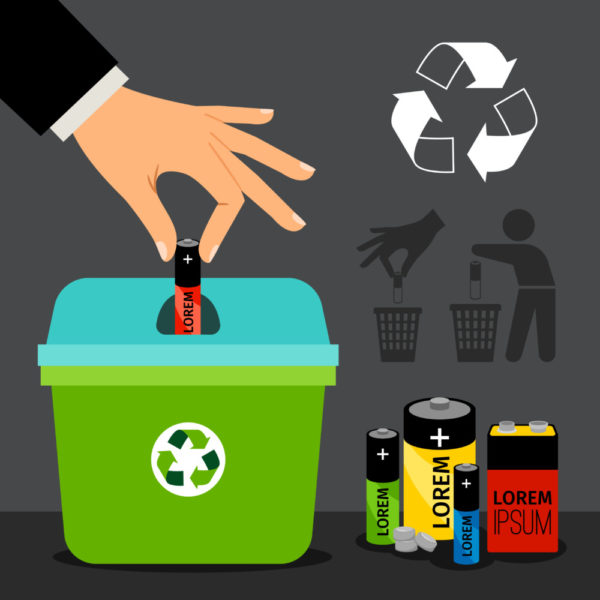Features
Adefolake Adekola: Waste Management in Nigeria – The Way Forward
 Waste is a universal environmental language everyone speaks because we all generate waste. The sources of waste vary in homes, hospitals, farms, schools, airports, industries, construction sites, offices, and mechanic workshops. Both developed and under-developed countries generate waste, but the difference between these two are the developed countries leave little or almost nothing to landfill.
Waste is a universal environmental language everyone speaks because we all generate waste. The sources of waste vary in homes, hospitals, farms, schools, airports, industries, construction sites, offices, and mechanic workshops. Both developed and under-developed countries generate waste, but the difference between these two are the developed countries leave little or almost nothing to landfill.
Waste can be defined as materials or substances that are discarded when they have served their purpose or are no longer useful. There are different types of waste, such as:
- Organic waste: This is waste generated from plants or animals. They are biodegradable and are broken down by organisms, thereby converted to manure. Examples of organic waste are fruit peel, food waste, animal waste, etc.
- Recyclable waste: These are materials that have served their initial purpose but can be reused or converted into a new product. Examples are plastic bottles and bags, glass, cans, paper, etc.
- Liquid waste: This is the waste that has no form or shape, some solid waste can be converted to liquid waste. Wastewater is the main example of liquid waste.
- Solid waste: As the name implies, the waste with a solid shape or form. This waste is responsible for the accumulation in landfills especially in countries with minimal recycling. Examples are furniture and old car tires.
- Hazardous waste: Is waste that is harmful to the human health and the environment. This waste is usually:
Corrosive – eats through metal
Toxic – poisonous
Inflammable – easy to catch fire
Reactive – can explode
Effects of poor waste disposal
- Air, land and water pollution
- Soil contamination
- Surface water contamination
- Leachate formation
- Poor health and living standard
- Poor sanitation
All these effects of poor waste disposal are reasons why we need to engage in waste management. This is not about the government doing something for us but about we doing something for ourselves. Waste management is the role of everyone in a nation.
The collection, transportation, processing, managing and monitoring of waste material to minimize the impact on the human health and environment is waste management. Waste management is important in Nigeria if we want to improve human health, boost our economy, decrease mortality rate, and increase our revenue generation. Currently, in Nigeria, we have focused on only two major ways for waste management.
1. Incineration: This is the burning of waste. Several communities which do not want to pay for waste collection by the body/corporation responsible resolve to burning their waste to save cost. Yes, they are saving their money, but that is at the detriment of their health. When waste is burnt, the smoke produced is called Carbon monoxide (CO) which is a greenhouse gas that is harmful to the nostrils, lungs and can cause difficulty in breathing. Not only does CO cause harm to the human health but also to the environment. This gas causes air pollution which leads to the depletion of the ozone layer and eventually global warming.
2. Dumpsite: Dumpsites and landfills are two different things. Landfills are usually sanitary and organized sites used for disposing of waste, whereby waste separation also occurs. Dumpsites, which are present in Nigeria, are the lands used to dump waste indiscriminately. Usually, the piece of land allocated for dumpsites are small, but over time. residents in that community begin to dispose of waste along the axis of the “landfill,” thereby expanding the area. Sooner or later, this becomes a problem for the residents in that area as their children begin to develop health issues such as pneumonia, asthma, difficulty in breathing and much more. In developed countries, the waste sent to landfills are waste that cannot be recycled and have outlived their usefulness. Whereas in Nigeria, a large percentage of our waste ends up in dumpsites. Even the recyclable waste that can be reused or organic waste that can be used as manure by farmers. For this reason, most dumpsites in Nigeria if not all are an eyesore and a source of concern to everyone living in that neighborhood.
Importance of Waste Management
- Protects the environment.
- Job creation.
- Revenue generation.
- Waste to wealth creation.
- Waste to energy.
- Conserves natural resources.
- Improves standard of living.
What can we do to improve waste management in Nigeria?
1. Waste separation should be incorporated everywhere, in schools, hospitals, airports, etc.
- All waste should be separated. Organic waste should be separated from hazardous waste, solid waste separated from liquid waste, and so on.
- Separate bins should be available everywhere to encourage waste recycling.
- Also, organic waste can be sold to farmers at a cheap rate for manure and recyclable waste to recycling companies.
2. Reduce the usage of materials that are difficult to recycle such as disposable spoons and plates.
3. Re-use of materials like shopping bags, gift wrappers, clothing, etc. This will reduce the frequent buying of new ones.
4. Recycle! This cannot be over emphasized or over-flogged. We need to increase our recycling practices in Nigeria. Recycle plastics, glass, paper, fabrics, cans, etc.























